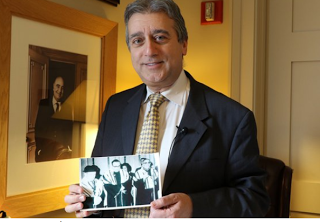
Lebanese-born Rabbi Elie Abadie holding a family photo (Stepfeed)
Stand by for a new film about the Jews of Lebanon. Rola Khayyat’s ‘From Brooklyn to Beirut’, here described by Nadine Mazloum in Stepfeed, tells how discovering a Syrian/Lebanese community in New York inspired her to make a film about the Jews of Lebanon. It seems that Rola is following in the footsteps of Nadia Abdelsamad, who made a BBC documentary about the Jews of Wadi Jamil, the Beirut Jewish quarter.
We really don’t know much about Lebanon’s Jewish community.
For many, “Lebanese Jewish” is too remote a concept. But, the truth is, Jews in Lebanon once lived side by side with the country’s Christian and Muslim populations. They even share a minorities’ seat in parliament.
Beirut’s Wadi Abu Jmil, Saida, Hasbaya and Tripoli were places they once called home, and Christmas and Eid were occasions to celebrate with neighbors. They even had several Synagogues where they would hold prayers every Saturday, one of which is in the Wadi Abu Jmil area – later known as Beirut’s Jewish quarter.
At its zenith, the Jewish population in Lebanon reached 15,000 in the early 50s, but now they’re estimated to be at less than 100. Many left at the onset of the Lebanese civil war, and many left for Brooklyn in the U.S. (This is a common myth – most left after the 1967 war -ed)
Their stories have disappeared from our collective consciousness, but with the effort of Rola Khayyat – a Columbia University graduate and visual artist based in New York – we may learn more about this community.
Her first documentary, “From Brooklyn to Beirut,” sheds light on the Lebanese Jewish diaspora of Brooklyn. It features interviews with members of the Lebanese Jewish community who returned to Beirut as part of a journey to rediscover a place they once called home.
StepFeed spoke with Khayyat to learn more about the film, the community and her interviewees: Rabbi Elie Abadie and Raymond Sasson.

Leave a Reply